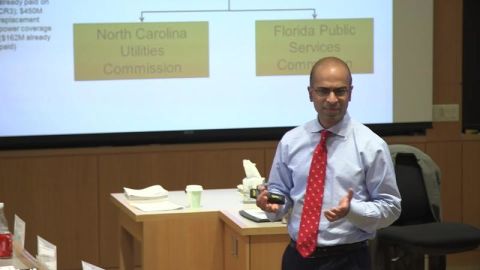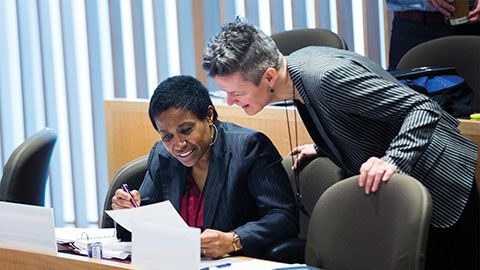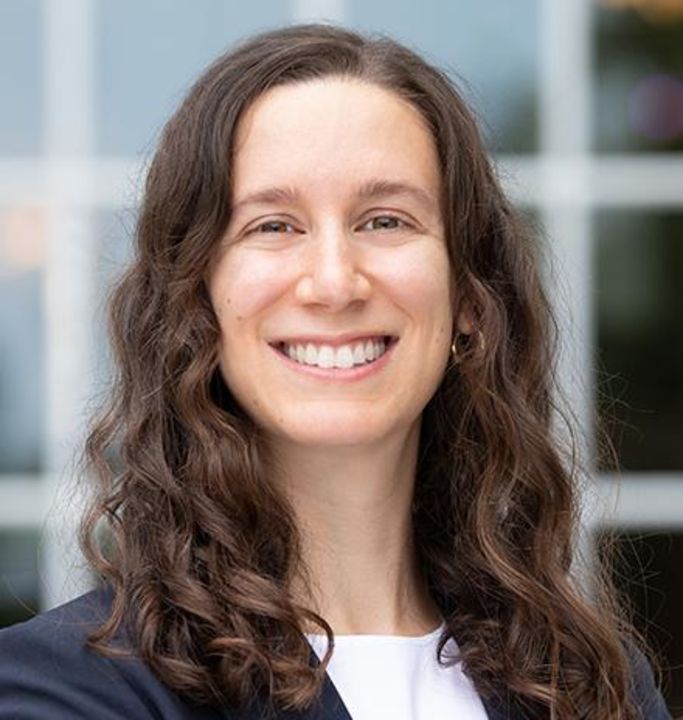Strategic Negotiations: Dealmaking for the Long Term
- Dates: TBD
- Format: In-Person Learning takes place on the HBS campus or a designated location.
- Location: HBS Campus
- Fee: TBD
How mastering negotiation skills can set you apart as a business leader.
How mastering negotiation skills can set you apart as a business leader.

Rethink how you negotiate and reach a winning deal.
Summary
The planning and strategizing process behind complex, high-stakes deals and major disputes can be even more important than your performance at the bargaining table. In this business negotiation strategy program, you will learn how to bring together the right players, identify and address key issues, and develop the best process for each deal—all before the negotiations even start.
This program is eligible for the Certificate of Management Excellence. Learn More
-
Summary
-
The planning and strategizing process behind complex, high-stakes deals and major disputes can be even more important than your performance at the bargaining table. In this business negotiation strategy program, you will learn how to bring together the right players, identify and address key issues, and develop the best process for each deal—all before the negotiations even start.

This program is eligible for the Certificate of Management Excellence. Learn More
DetailsExpand AllCollapse All
Implement a strategic planning process for any negotiationImplement a strategic planning process for any negotiation
- Create efficiencies by developing a systematic approach to managing negotiations
- Synchronize internal and external negotiations
- Address the complexities associated with multiple parties and agendas as well as evolving timeframes
- Negotiate effectively across borders and cultures
- Foster understanding and promote resolution among parties whose interests and perceptions conflict
Maximize value for the long termMaximize value for the long term
- Design deals that create optimal value for all players at the bargaining table
- Manage the tension between creating value jointly and claiming value individually
- Build and sustain productive, long-term business relationships with all parties involved
Expand your personal and professional networkExpand your personal and professional network
- Extend your network by living and working with accomplished executives from various backgrounds, industries, and countries across the globe
- Build relationships with a diverse group of peers who can provide wide-ranging insights into your business challenges and career decisions
Implement a strategic planning process for any negotiation
- Create efficiencies by developing a systematic approach to managing negotiations
- Synchronize internal and external negotiations
- Address the complexities associated with multiple parties and agendas as well as evolving timeframes
- Negotiate effectively across borders and cultures
- Foster understanding and promote resolution among parties whose interests and perceptions conflict
Maximize value for the long term
- Design deals that create optimal value for all players at the bargaining table
- Manage the tension between creating value jointly and claiming value individually
- Build and sustain productive, long-term business relationships with all parties involved
Expand your personal and professional network
- Extend your network by living and working with accomplished executives from various backgrounds, industries, and countries across the globe
- Build relationships with a diverse group of peers who can provide wide-ranging insights into your business challenges and career decisions
Who Should Attend
- Senior executives who face complex and challenging negotiations, such as CEOs, entrepreneurs, board members, general managers, business development executives, and corporate counsels
- Ideal for: Business leaders with cross-border negotiating experience who are in the process of realigning corporate strategy, undertaking a sizable deal, settling a major dispute, or juggling multiple constituencies
-
Who Should Attend
-
- Senior executives who face complex and challenging negotiations, such as CEOs, entrepreneurs, board members, general managers, business development executives, and corporate counsels
- Ideal for: Business leaders with cross-border negotiating experience who are in the process of realigning corporate strategy, undertaking a sizable deal, settling a major dispute, or juggling multiple constituencies
Dive Deeper into the ExperienceSee how exchange with faculty and peers yields new insights into critical business trends.How mastering negotiation skills can set you apart as a business leader.Global perspectives > Leadership growth > Organizational impact.
Complementary Program
Advance your Strategic Negotiations learning through a complementary program, Mergers and Acquisitions, which focuses on structuring, executing, and closing the best deals. Together, these programs provide a powerful framework for buying, selling, and managing assets, as well as advanced techniques for negotiating successfully at the M&A bargaining table.
-
Complementary Program
-
Advance your Strategic Negotiations learning through a complementary program, Mergers and Acquisitions, which focuses on structuring, executing, and closing the best deals. Together, these programs provide a powerful framework for buying, selling, and managing assets, as well as advanced techniques for negotiating successfully at the M&A bargaining table.
Learning and Living at HBS
When you participate in an Executive Education program on the HBS campus, you enter an immersive experience where every aspect of the learning model has been carefully designed to facilitate your growth. Your learning will take place on your own, in your living group, and in the larger classroom, driven by the renowned HBS case method.
-
Learning and Living at HBS
-
When you participate in an Executive Education program on the HBS campus, you enter an immersive experience where every aspect of the learning model has been carefully designed to facilitate your growth. Your learning will take place on your own, in your living group, and in the larger classroom, driven by the renowned HBS case method.
Admissions Criteria and Process
Answering Your Questions
Application Submission
Application Review
Fee, Payment, and Cancellations
Answering Your Questions
Application Submission
Application Review
Fee, Payment, and Cancellations
What You Will Learn
Immersed in a rich and focused learning experience that includes faculty presentations, group discussions, and case studies, you will explore how the world's best dealmakers plan and navigate complex negotiations. Through an in-depth examination of the three dimensions of negotiating, you will learn how to weave together a series of mutually reinforcing decisions and activities to drive optimal results.
You will also participate in interactive simulations—beginning with simple two-party deals and moving to complex, multi-party, multi-issue negotiations—which bring to life the importance of strategic planning
Participants should expect to spend at least 9-12 hours on self-paced case preparation prior to attending the program. Case materials will be made available approximately two weeks prior to program start.
-
What You Will Learn
-
Immersed in a rich and focused learning experience that includes faculty presentations, group discussions, and case studies, you will explore how the world's best dealmakers plan and navigate complex negotiations. Through an in-depth examination of the three dimensions of negotiating, you will learn how to weave together a series of mutually reinforcing decisions and activities to drive optimal results.
You will also participate in interactive simulations—beginning with simple two-party deals and moving to complex, multi-party, multi-issue negotiations—which bring to life the importance of strategic planning
Participants should expect to spend at least 9-12 hours on self-paced case preparation prior to attending the program. Case materials will be made available approximately two weeks prior to program start.
Key TopicsExpand AllCollapse All
The first dimension: maximizing effectiveness at the tableThe first dimension: maximizing effectiveness at the table
One-dimensional (1D) negotiators seek interpersonal effectiveness, whether in person, by email, or on the phone. They focus on elements of the immediate negotiating process, such as:
- Employing the most appropriate bargaining styles
- Creating the right atmosphere and setting communication dynamics
- Building trust
- Framing issues attractively
- Persuading others
- Deciphering body language
- Bridging cultural differences
The second dimension: engineering the dealThe second dimension: engineering the deal
Two-dimensional (2D) negotiators relentlessly look beyond the interpersonal process to the underlying substance of the problem, identifying where potential value exists and how to build agreements that realize this value for both sides. They focus on the principles of deal-crafting—the engineering of value creation among potentially cooperative parties.
The third dimension: designing the processThe third dimension: designing the process
Three-dimensional (3D) negotiators know that once the bargaining table has been set, much of the game already has been played. They think hard about the architecture of the deal—how to set up and, if necessary, reset the table. Not only do 3D negotiators skillfully play the game as given, but they also act entrepreneurially on multiple planes to change the game and gain maximum advantage. They focus on issues such as:
- Who should be at the table? What is the best means to get them there? In what sequence and on what basis should they be approached?
- What set of issues should be discussed? Is it most productive to separate or combine issues?
- Which process is best?
- How should expectations be set?
- What are the no-deal alternatives?
- Should there be a series of tables, possibly linked, separated, sequenced, or arranged in parallel?
The first dimension: maximizing effectiveness at the table
One-dimensional (1D) negotiators seek interpersonal effectiveness, whether in person, by email, or on the phone. They focus on elements of the immediate negotiating process, such as:
- Employing the most appropriate bargaining styles
- Creating the right atmosphere and setting communication dynamics
- Building trust
- Framing issues attractively
- Persuading others
- Deciphering body language
- Bridging cultural differences
The second dimension: engineering the deal
Two-dimensional (2D) negotiators relentlessly look beyond the interpersonal process to the underlying substance of the problem, identifying where potential value exists and how to build agreements that realize this value for both sides. They focus on the principles of deal-crafting—the engineering of value creation among potentially cooperative parties.
The third dimension: designing the process
Three-dimensional (3D) negotiators know that once the bargaining table has been set, much of the game already has been played. They think hard about the architecture of the deal—how to set up and, if necessary, reset the table. Not only do 3D negotiators skillfully play the game as given, but they also act entrepreneurially on multiple planes to change the game and gain maximum advantage. They focus on issues such as:
- Who should be at the table? What is the best means to get them there? In what sequence and on what basis should they be approached?
- What set of issues should be discussed? Is it most productive to separate or combine issues?
- Which process is best?
- How should expectations be set?
- What are the no-deal alternatives?
- Should there be a series of tables, possibly linked, separated, sequenced, or arranged in parallel?
The HBS Advantage
Our Executive Education programs are developed and taught by HBS faculty who are widely recognized as skilled educators, groundbreaking researchers, and award-winning authors. Through their board memberships, consulting, and field-based research, they address the complex challenges facing business leaders across the globe.
Gordon Donaldson Professor of Business Administration
Assistant Professor of Business Administration
H. Douglas Weaver Professor of Business Law
Joseph Flom Professor of Law and Business
-
The HBS Advantage
-
Our Executive Education programs are developed and taught by HBS faculty who are widely recognized as skilled educators, groundbreaking researchers, and award-winning authors. Through their board memberships, consulting, and field-based research, they address the complex challenges facing business leaders across the globe.
Faculty ChairGordon Donaldson Professor of Business Administration
HBS Unit:Negotiation, Organizations & MarketsFacultyAssistant Professor of Business Administration
HBS Unit:Negotiation, Organizations & MarketsHarvard Business School:H. Douglas Weaver Professor of Business Law
Harvard Law School:Joseph Flom Professor of Law and Business
HBS Unit:Negotiation, Organizations & Markets
Your Peers Expand Your Learning
-
Your Peers Expand Your Learning
-
Global PerspectiveExperience the world in your classroom.Global PerspectiveExperience the world in your classroom.6%Africa13%Asia Pacific36%Europe8%Latin America4%Middle East33%North America6%Africa13%Asia Pacific36%Europe8%Latin America4%Middle East33%North AmericaTop Industries RepresentedInsights from a range of industries ignite your thinking.Insights from a range of industries ignite your thinking.19%Financial10%Nonprofit Services8%Chem / Pharma / Bio8%Consumer Products8%High Technology6%Raw Materials / Energy6%Retail Services4%Communications4%Professional Services4%Real Estate / ConstructionTop Industries RepresentedInsights from a range of industries ignite your thinking.19%Financial10%Nonprofit Services8%Chem / Pharma / Bio8%Consumer Products8%High Technology6%Raw Materials / Energy6%Retail Services4%Communications4%Professional Services4%Real Estate / ConstructionExperienceExperienceYears workedYears workedExperienceYears workedLess than 10 yearsLess than 10 years10-14 years10-14 years15-19 years15-19 years20-24 years20-24 years25-29 years25-29 years30-34 years30-34 years35-39 years35-39 yearsLess than 10 yearsLess than 10 years10-14 years10-14 years15-19 years15-19 years20-24 years20-24 years25-29 years25-29 years30-34 years30-34 years35-39 years35-39 years
How mastering negotiation skills can set you apart as a business leader.
How mastering negotiation skills can set you apart as a business leader.


















